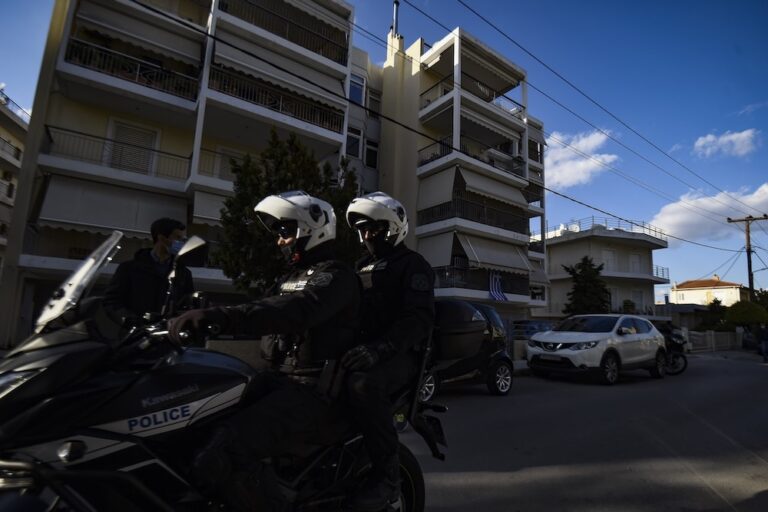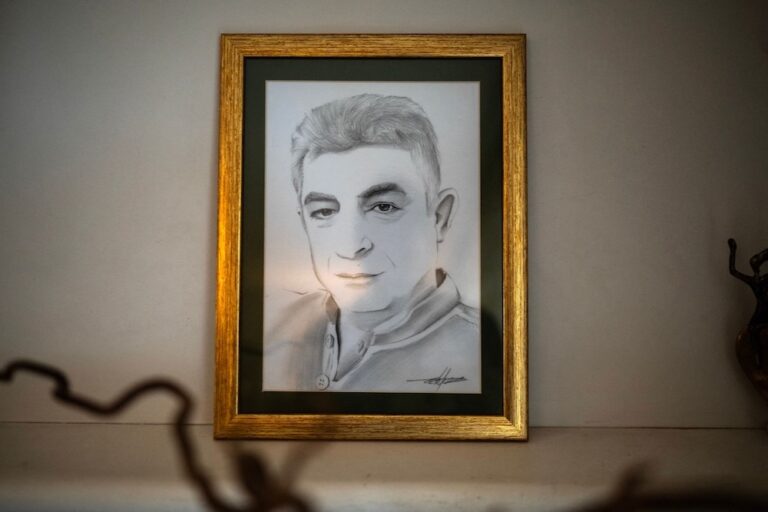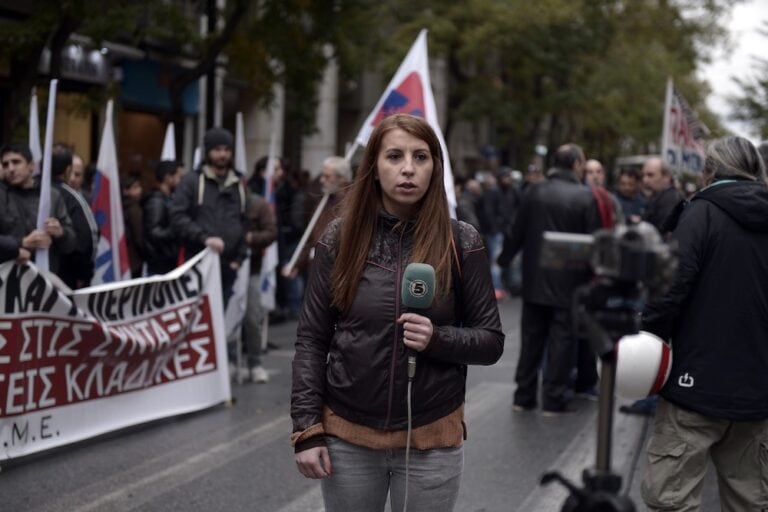(GHM/IFEX) – The following is an excerpt on freedom of expression and media from a 7 January 2000 joint GHM and Minority Rights Group-Greece annual report on human rights in Greece: GREEK HELSINKI MONITOR (GHM) MINORITY RIGHTS GROUP-GREECE (MRG-G) P.O. Box 60820 GR-15304 Glyka Nera Greece Tel. +30-1-347.22.59 Fax +30-1-601.87.60 e-mail: office@greekhelsinki.gr web page: http://www.greekhelsinki.gr […]
(GHM/IFEX) – The following is an excerpt on freedom of expression and media from a 7 January 2000 joint GHM and Minority Rights Group-Greece annual report on human rights in Greece:
GREEK HELSINKI MONITOR (GHM)
MINORITY RIGHTS GROUP-GREECE (MRG-G)
P.O. Box 60820 GR-15304 Glyka Nera Greece
Tel. +30-1-347.22.59 Fax +30-1-601.87.60
e-mail: office@greekhelsinki.gr web page: http://www.greekhelsinki.gr
HUMAN RIGHTS IN GREECE:
JOINT CONCISE ANNUAL REPORT FOR 1999
7 January 2000
GHM and MRG-G Focus: Freedom of expression and media; conscientious objectors; protection of ethnic minorities; citizenship; religious tolerance; protection of asylum seekers and immigrants; harassment of human rights activists.
Introduction
The most positive development in 1999, with lasting effects, was the consistently commendable work of the Ombudsman’s office, set up in October 1998. His reports have provided official documentation to many longtime human rights violations and offered concrete solutions, some of which were soon after implemented. Moreover, in late July 1999, for the first time in Greece’s modern history, there was a debate on the possible modernization of the country’s minority and citizenship policies. Under the impetus of Foreign Minister George Papandreou, a renowned supporter of multiculturalism, the public was informed that Greece was finally moving towards the application of the internationally accepted norms for national minorities and the recognition of the right to self-identification for Macedonians and Turks. However, this created a general backlash among politicians and media against the Minister, and the minority and human rights NGOs that had previously made similar demands: as a result, the ratification of the Framework Convention on National Minorities, announced for the fall, was postponed indefinitely.
Many Greek journalists faced charges for criticizing public officials and/or were convicted to prison sentences for libel. Self-censorship and distortion of information were present in the coverage of the NATO air strikes on the Federal Republic of Yugoslavia. Alternative civilian service was made available to Conscientious Objectors, yet its application in practice continued to be punitive. Religious minorities faced different forms of discrimination by various local officials. Some Macedonians born in Greece continued to have problems entering their fatherland. The Roma minority faced numerous evictions, horrendous health and hygienic conditions, as well as social marginalization. There remained stateless people, recurrently harassed by the authorities. Immigrants faced discrimination and xenophobia and were unfoundedly blamed for the rise of criminality. The activities of human rights and minority organizations were occasionally met with hostility and predominant ‘hate speech’ in the media.
Freedom of Expression and the Media
In general, Greek media were free, but there were still cases of journalists brought to court for alleged crimes related to the exercise of their profession. Despite multiple appeals by GHM and international freedom of expression organizations, Greece continued to punish journalists with prison sentences in cases of libel or defamation and to prosecute them for the publication of leaked confidential documents.
– In a positive development, on 21 January 1999, an Appeals Court acquitted Yannis Tzoumas, journalist and publisher of Alithia, a daily on the island of Chios. Tzoumas had been convicted in 1998 to four months’ imprisonment for defamation because his paper had called Minister Stavros Soumakis “minister of the ship owners … who sunbathes at the villas of the ship owners.” During the first instance trial, the facts were confirmed as accurate, but the court considered the “harsh style” of the article defamatory. The Appeals Court confirmed the veracity of the facts and stated that there was no intent to defame the minister but only to criticize his behavior, albeit in harsh style.
– Also in January 1999, the Supreme Court overturned a July 1998 censorship verdict. A Thessaloniki court had ordered the removal from the Dictionary of the Modern Greek Language, in every future reprint or edition, of the mention to the abusive use of the word “Bulgarian” to mean players and fans of soccer teams based in Thessaloniki, northern Greece. In the verdict, the Supreme Court stated that the disputed dictionary entry did constitute an offence against the plaintiff (lawyer and elected city councilor of Thessaloniki, Theodore Aspasidis), but that the offence was not against the law, as it was included in a scholarly publication, and there was no intent to offend the plaintiff.
– On 7 March 1999, the Chief Prosecutor of the First Instance Court of Athens, G. Koliokostas, brought criminal charges for disclosure of state secrets -punishable with up to ten years imprisonment under article 146 of the penal code- against all those responsible for the publication on 6 March in the country’s largest daily newspaper Ta Nea of a top secret report. The report was written by Greek Ambassador to Kenya G. Kostoulas and covered the events that contributed to Ocalan’s capture by Turkey. In October, reporter George Papachristou and his publisher Leon Karapanayotis -charged as an instigating principal under article 46- answered the charges to the investigating judge. The case is expected to go to court in 2000.
– In March 1999 journalist Manolis Vasilakis was fired by the Exousia newspaper for an article in which he was examining the role of the nationalist group ‘Network 21’ in the Ocalan case. Network 21 members have since filed suits for aggravated defamation in civil courts, against him and many more journalists who made similar arguments, asking for disproportionate fines of hundreds of million of drs ($1=app. 300drs).
– On 4 May 1999, a Three-Member Misdemeanor Court of Xanthi convicted Greek Helsinki Monitor Spokesperson Panayote Dimitras to a suspended sentence of 5 months in prison for defamation of minority lawyer Orhan Hadjiibram. P. Dimitras was never properly summoned and was nevertheless tried in abstentia. The court considered defamatory a GHM statement critical of Hadjiibram’s handling of the stateless issue, even though it stated that the facts therein were true. The court did not specify which words, phrases or sentences were defamatory, but considered that there was intent to defame the lawyer. An appeal is set for 12 January 2000.
– On 18 May 1999, journalist Dimitris Rizos, editor and publisher of the “Adesmeftos Typos” daily, was given by a Three-Member Misdemeanor Court of Athens a five-month suspended sentence for insulting George Papazoglou, a former cadre of the newspaper. The incriminating text did include insulting characterizations of Papazoglou. Rizos was set free on appeal.
– On 19 May 1999, journalist Charalambos Triantafyllidis, editor and publisher of the Enimerosi weekly (in Florina, northwestern Greece), was convicted by the three-member Appeals Court in Kozani, and given a five-month suspended prison sentence for insulting Florina’s then prefect-elect Pavlos Altanis, on 11 November 1998. The incriminating text was nothing more than strong criticism of the alleged clientelistic and revengeful actions of the newly elected prefect and had no outright insulting characteristics that could stand in a fair court. Triantafyllidis was also given a fine of GDR 500,000 (approx. USD 1,635) for damages.
– On 21 May 1999, Dimitris Rizos was convicted by a Three-Member Appeals Court of Athens to twelve months in prison for the repeated aggravated defamation of four members of the board of directors of the rival Eleftheros Typos daily. His incriminating interview to a television station in September 1994 did include unsubstantiated allegations of embezzlement of funds. Rizos’ sentence was converted to a pecuniary one. He bought it off and was set free.
– On 1 June 1999, Vicky Bataya, publisher of “High” magazine, was convicted by a Three-Member Misdemeanor Court of Athens to 18 months in prison for aggravated defamation of singer George Dalaras. She was set free on appeal.
– In another positive development, on 28 June 1999, an Appeals Court converted to a fine a previously imposed three-year sentence to the publisher of the daily “To Onoma” Makis Psomaidis for aggravated defamation of Minister Costas Laliotis. In 1998, the latter was first convicted to four years in prison, and the Supreme Court had partially overturned the judgement. He paid the fine and was set free.
– On 1 September 1999, the publisher of the local newspaper “Rhodiaki” in Rhodoes, Athanasios Marasiotis, was briefly arrested following charges brought against him for defamation by an individual. The charges were based on the fact that the newspaper published an out of court summons by a company claiming that the individual owed a large sum to the company. The publisher of another local paper, “Proodos,” George Diamantidis, also charged for the same reason, escaped arrest as he was absent. It was reported that the arrests were sought because of past criticism of the police by these newspapers.
– In November 1999, the Public Prosecutor of Mytilini indicted two journalists for defamation and aggravated defamation (articles 362 and 363 respectively) after charges were brought by the police of Lesvos. The two journalists, Stratis Balaskas and George Kondiloudis, had written an article in the Eleftherotypia newspaper. The article referred to alleged relations of police officers of Lesvos with smugglers in a local olive press.
– On 6 December 1999, a three-member Misdemeanor Court of Athens convicted Dimitris Rizos, publisher of “Adesmeftos Typos,” for aggravated defamation of Costas Mitsis, publisher of another newspaper with the exact same name, “Adesmeftos Typos.” He was sentenced to ten months in prison and was set free on appeal.
Although most journalists would deny its existence, self-censorship, especially on sensitive “national” issues, is a common practice among journalists in order to preserve their jobs and status. The coverage of the war in the Federal Republic of Yugoslavia provided several examples in this respect. In a letter to the Journalists’ Union of Athens (ESIEA), on 4 April 1999, veteran journalist Richardos Someritis stated that
“… many Greek journalists, mainly in radio and television broadcasting, behave like soldiers in the front: they have chosen their camp, their uniform, their flag. If they are columnists, it is their right to do so. Nevertheless, how come even the Patriarch is censored by many of the media? Isn’t ESIEA concerned about this problem? Shouldn’t it remind journalists that their role is to inform? I wonder if our statutes and our code of ethics have been replaced by declarations of various committees of ‘friendship’ and propaganda.”
On 2 April 1999, regarding the closure of the Serbian radio station B92 by the Serb authorities, the Greek state news agency reported on a statement by the International Federation of Journalists (IFJ), but mentioned none of the main IFJ arguments. Moreover, the IFJ reference to the credibility of military information was selectively distorted while no reference was made to the IFJ’s denunciation of the information blackout in Kosovo and the crackdown on the media in Serbia. Only after GHM raised the issue, did the agency write a complete coverage of the story.
On 11 June 1999, the private “Mega Channel” censored its mandatory pre-electoral program devoted to presentations by small parties, by removing the presentation of “Rainbow,” the Macedonian minority party, while keeping all other presentations including the one made by the extreme-right “National Front”. The National Radio and Television Council did not take the prescribed by law sanction, while no one condemned this act of censorship.
On 21 October 1999, two journalists from Halkidiki’s “Super Channel” were beaten by a mob led by Mayor Costas Papayannis, in Kasandra, Halkidiki (Northern Greece). Costas Glykos and Michalis Katsamiras were covering the mob’s attempt to prevent the local Jehovah’s Witnesses (JWs) from starting the construction of their house of worship, construction that had been authorized by the authorities. During the violent incident, JWs as well as two representatives of the Ombudsman’s office were harassed by the mob. The two journalists and the JWs pressed charges against the mayor and some alleged accomplices. On 22 October, the prosecutor formally indicted the mayor and his accomplices for crimes that included inciting to religious hatred. Nevertheless, neither during the incident, nor in the ensuing forty-eight hours, did the police arrest the alleged perpetrators of the crimes as called for by the code of criminal procedure.
On 9 November 1999, an Athens Court postponed for 2000 the trial of Sotiris Bletsas, member of the Society for Aroumanian (Vlach) Culture. He was indicted because in 1995 he had distributed a publication of the European Union’s Bureau for Lesser Used Languages (in which Sotiris Bletsas was the Greek “observer”) which mentioned the minority languages in Greece. The prosecution for dissemination of false information (article 191 of the Penal Code) was triggered by charges pressed by ND deputy Eugene Haitidis and the prosecution’s witnesses included the leadership of the Panhellenic Union of Vlach Associations.
On 2 December 1999, twelve police officers raided the administrative offices of the non-profit association ‘Biblical Circle’ running Channel Station 2000 Radio, and arrested 73-year-old retired pastor Lakis Regas, who was working as a technician on the premises when the police arrived. Regas spent the night in jail. He was released the next day by a judge’s order. Greek authorities accused Channel Station 2000 of not having the proper operating license, but it is well known that no private radio station has ever managed to get one. A trial was set for 31 January 2000. In 1994, the government had already shut down Greece’s only Evangelical television station, “Hellas 62.”
On 20 October 1999, a citizen’s arrest of a “cameraman” during a demonstration led to the revelation that, at least since 1994, police officers were being officially assigned the duty of filming demonstrations and were given professional cards of photo press agencies as covers. Following media protests, authorities gave a vague promise they will stop such practice.
Finally, Evangelos Yannopoulos, abusing of his parliamentary immunity and his influential position of Minister of Justice, has repeatedly attacked and insulted journalists or other politicians who have been vocally critical of his present or past record, including by bringing charges against them. On 5 January 2000, a Three-Member Appeals Court of Athens convicted Prefect of Athens Theodore Katrivanos to 15 months in prison for aggravated defamation of the Minister, because he had challenged the latter’s controversial resistance record during the Second World War. During the long trial, the Minister insulted veteran journalist Yannis Voultepsis calling him a “stool;” and brought charges against the communist daily “Rizospastis” for aggravated defamation along with a civil suit for 500 million drs. The newspaper had published Katrivanos’ arguments challenging the Minister’s record. ESIEA protested for the Minister’s behavior.
[the full report can be found at: http://www.greekhelsinki.gr/pdf/ghm-mrgg-concise-annual-99.PDF]
Recommended Action
Send letters of protest to authorities:
Appeals To
George Papandreou
Foreign Minister
Athens, Greece
Fax: +30 1 368 1433Dimitris Reppas
Minister of Press and Information
Athens, Greece
Fax: +30 1 360 6969Evangelos Yannopoulos
Minister of Justice
Athens, Greece
Fax : +30 1 775 5835
Please copy appeals to the source if possible.


